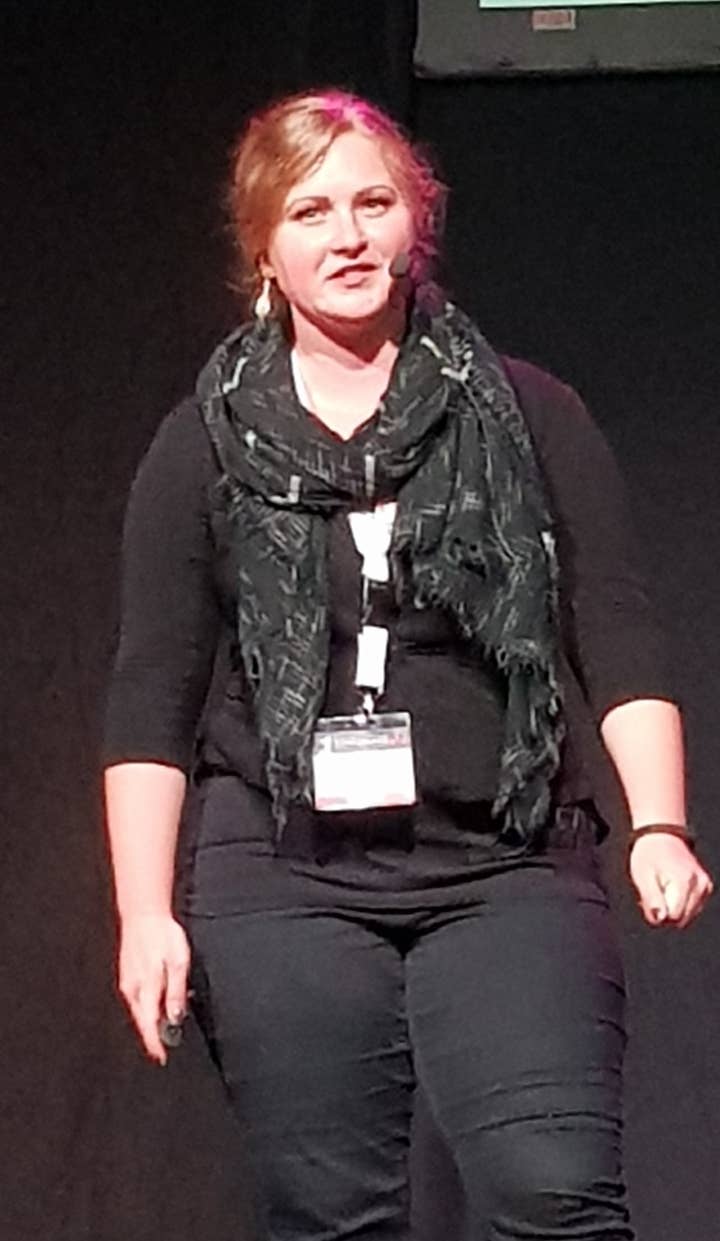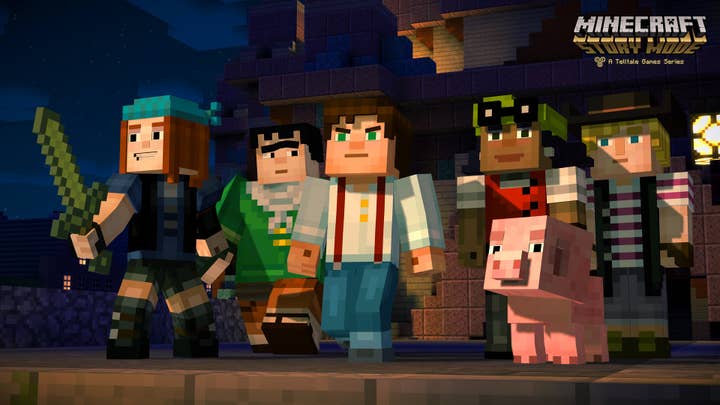A post-mortem of Telltale Games
Speaking at Sweden Game Conference 2018, former Telltale narrative designer Emily Grace Buck says it's time for a “really serious conversation about potentially starting a union”
Extensive rewrites days before going gold, crunch culture, a fear of being replaced, and a "fundamental misunderstanding" of its audience are just part of the picture for what brought about the demise of Telltale Games, according to former narrative designer Emily Grace Buck.
Speaking this week during a presentation at the Sweden Game Conference in Skövde, Buck offered insight into what happened to the award-winning studio of 270 staff that collapsed overnight.
While Buck conceded that she is not a spokesperson for the other former employees, and the closure of Telltale was multi-faceted and more complicated than any one thing, her words offer a rough post-mortem.
Back in November last year, Telltale laid off around 25 per cent of its staff, something which Buck said "got handled, honestly, about as well as a layoff could be handled". Those affected were given severance, and healthcare coverage through to the end of year; there was a even a job fair.

The lay offs on September 21, however, couldn't have been more different, said Buck. The entire company was called in for a morning meeting where the CEO Pete Hawley announced that 90 per cent of staff were being let go and had 30 minutes to leave the building, with no severance and healthcare coverage for only nine more days.
Just the day before, Telltale management was holding on to hopes that either AMC or Smilegate would come through with funding to keep the studio open; both pulled out within hours of each other, quickly followed by existing investor Lionsgate writing off its investment. From there, one of the HR personnel ended up staying until 3am that night, making redundancy packets for everybody, including herself.
Buck, who had been episode two design lead for The Walking Dead: The Final Season, and was also working on season two of The Wolf Among Us, said that although there was a supportive, "family environment" at the studio, there was also a problem with crunch culture, especially during the first two of her three years there.
Drawing comparisons to the recent Rockstar controversy, Buck refuted co-founder Dan Houser's comments that it was only a small team of senior writers "who work very hard purely because they're passionate about a project".
"As a person who has been on that 'small team' of lead writers and narrative designers re-doing things, let me tell you that can be catastrophic for the rest of the team," said Buck. "We often, at Telltale, after executive reviews, had to do 90 per cent rewrites of the game."
She added that rewriting anywhere between 60 and 90 per cent of a game was common occurrence, sometimes days before being sent off for certification, creating a whole host of problems for the downstream teams.
"Telltale Games often got knocked for being very buggy and having a lot of frame skips," said Buck. "Yes, we had some of those, but a lot of the time what people thought were frame skips or buggy parts of our engine, were actually scenes that had gotten redone so last minute, that there was no time to smooth out the cinematography or the animation.... what you were seeing was not a product of a buggy engine, but buggy management system."
"As a person who has been on that 'small team' of lead writers and narrative designers re-doing things, let me tell you that can be catastrophic for the rest of the team"
So what went wrong? Buck believes that one of the biggest problems was a "fundamental misunderstanding of who our audience was" among most, though not all, of the executive leadership.
Both Minecraft: Story Mode, and Guardians of the Galaxy were games where this misunderstanding were apparent, said Buck. The first two episodes of Minecraft: Story Mode were originally M-rated, and had to be rewritten; in this case, Buck said, it was fortunate as it was clearly misaligned with the younger target demographic of Minecraft.
[UPDATE]: After the publication of this article, Buck posted on Twitter that she had been mistaken on Mincraft: Story Mode, and that it was originally intended to be rated T, not M, saying, "I played it, & it was not appropriate for young kids... but not that raunchy. My deepest apologies for the wrong information."[/UPDATE]
With Guardians of the Galaxy, however, it was almost the exact opposite. Much like the source material, which the creative team studied extensively in order to try and capture the tone and feel of the universe, the original draft of the game was funnier and more "goofy", but that was all stripped out to lean into a darker, grittier feel, that was tonally off from the franchise.
"Our executive team insisted that what was popular about Guardians of the Galaxy, was darkness and violence, and sadness," said Buck. "And that people did not associate humour with that brand... So we redid the first two episodes to be less funny and more dark and more violent and more sad, and that's the game that shipped. And one of the biggest comments in editorial, was that it felt very off-tone for Guardians of the Galaxy and wasn't very funny. And we were like 'we know'."

But this highlighted another core problem within Telltale, Buck added; it's not just the "fundamental misunderstanding" from the executive team, but also an unwillingness to listen, and on the occasions they did, "it was very, very often an uphill battle, and one that was scary to fight".
"If you fought it too hard, you would be taken off a project, replaced, or even let go, and that happened to people on a number of occasions," said Buck. "So we were trying as hard as possible to cater to who our executive team thought out fanbase was, this core gamer-type audience. And we did cultivate a pretty large audience of that type as well all of the other types of people."
After Telltale laid off 90 per cent of its staff, things quickly began to spiral. Buck, who had inadvertently found herself at the centre of the fallout, became subject to harassment through Twitter, Facebook, LinkedIn and even angry phone calls from entitled fans.
"I'd wake up to a thousand notifications, many of them targeted harassment at me for not finishing the game I wasn't even working on anymore at the time the studio closed," said Buck
Worse still, Telltale is located in Marin County, near San Francisco, and is one of the most expensive places to live in the United States, with a one-bedroom apartment costing around $2,500 a month to rent.
While there was an effort from the wider industry to help, with #TelltaleJobs trending on Twitter, and hundreds of studios offering assistance, including 37 which showed up for a jobs fair with less than a week's notice, only 20 per cent of those laid off have found new work.
"It's happening. It's creating a lot of good, but it has not been as overwhelmingly successful and immediate as some of media has [made it] seem," said Buck. "A lot of people are still looking for work. A lot of people haven't got that many interviews yet, especially some of our more junior staff."
"In the United States, where your work is tied to your healthcare, I think we need to have a really serious conversation about potentially starting a union"
Buck admitted that in another context this 20 per cent re-employment rate would be "really good", but with no severance, no healthcare, no notice, and extremely high-living costs, there are a lot of people who have been left out in the cold.
"How do we start holding leadership accountable to the people who work for their company?" asked Buck. "How do we convince them to stop gambling with our livelihoods in an attempt to get more funding? Because quite frankly... at Telltale that's kind of what happened. Those weren't done deals. It was always possible that they could fall through. That's how deals work...
"So I'm not going to say this is the only answer, or even necessarily the best answer, but especially in the United States, where your work is tied to your healthcare, I think we need to have a really serious conversation about potentially starting a union."
After underlining quite how unpopular unions are in the United States, her comments met with a round of applause from the audience.
"Something needs to shift in the way that companies in the US are treating their workers," she continued. "I mean not just in games, but definitely in games."
The recent SAG-AFTRA strikes, which saw video game voice actors protest, and ultimately win a case for receiving a cut of a game's profits, highlights an unfair disparity within the industry, Buck argued. She added that many voice actors suggested it was something which developers should also be pushing for.
"It would at least be nice to have some sort of safety network to rely on if you end up out in the cold unable to pay rent," she said, addressing the audience. "We need to have a conversation. We need to talk about what our options are. We deserve a lot better than what happened at Telltale. Not just the Telltale devs, but everyone in the gaming community...
"We deserve a lot better than what this industry is giving us right now, and I hope that by listening to this talk, you're thinking about what's going on at your own company. If you know the finances, are you confident that you can take care of everyone? Are you someone who mandates extra long hours? Are you someone who voluntarily works extra long hours to show that you're passionate, and might be accidentally creating a culture of overwork at your company? Are you someone who might want to start to form a union?"
Despite growing ever larger, the games industry is "so tight knit" Buck concluded. "There are more of us than ever before but we're so deeply interconnected all over the world, let's help each other out as much as we can."
CORRECTION: The reference to the SAG-AFTRA strike is incorrect. While actors did not win a share of a game's profits, they did secure a new bonus pay structure depending on how many recording sessions are needed.
GamesIndustry.biz has attended Sweden Game Conference with help from the organisers.








